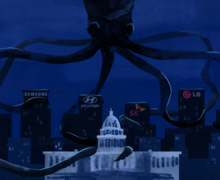SU alum Leo Wong discusses cultural identity, diversity in workplace at lecture
Kennedy Rose | News Editor
Leo Wong spoke as part of the university’s “Paving the Way Alumni Speaker Series” on Tuesday during SU’s celebration of Asian American and Pacific Islander Heritage Month.
Syracuse University alum Leo Wong spoke about the effect Chinese American heritage had on both his time at SU and professional career during a lecture on Tuesday night.
Wong discussed his life — starting with his youth experience, and ending with his current position as an adjunct professor at the University of Oklahoma. Wong is also a director at Gold House Collective, a collective of Asian American professionals that works to support and celebrate Asian Americans in creative and leadership roles.
The event was held as part of SU’s celebration of Asian American and Pacific Islander Heritage Month.
The Office of Multicultural Affairs and the Office of Multicultural Advancement co-hosted the event. Wong’s lecture was also a part of SU’s “Paving the Way Alumni Speaker Series.”
Wong described his early life as the child of two immigrants from Hong Kong. His parents divorced when he was very young, and he spent more time with his mother growing up, Wong said.
He developed a close relationship with his mother and adopted her open-minded personality. Wong said that it was her support for his ambitions that encouraged him to enter the advertising field.
“My mom always said to me: ‘Your biggest asset is your mouth. Please use that in your career,’” Wong said. “I could interpret that in two ways: I could become a lawyer or I could do communications.”
Wong chose the latter and decided to attend the S.I. Newhouse School of Public Communications. At SU, he became involved in organizations including the WellsLink Leadership Program and The NewsHouse. He was also a Remembrance Scholar and a brother of Phi Delta Theta, which he helped to reestablish at SU.
Coming to SU was an eye-opening experience, Wong said. He grew up in a predominantly Asian American area of California, and at SU he found himself surrounded by mostly white students. Wong viewed his time at SU as a “turning point” in his life.
He said SU helped him realize his cultural identity was more significant than he had originally thought. At this point, Wong said he became more interested in educating people about his Chinese background and sharing his culture with others. He said he realized the importance of embracing his cultural identity.
Wong also spoke to the audience about how to succeed in life despite cultural barriers. He discussed the idea of using ethnic or gender-based stereotypes to peoples’ advantages. Wong encouraged the audience to take people’s judgments as fuel to prove their assumptions wrong.
“You walk into a room and you can tell what people are thinking of you,” Wong said. “I’ve definitely been the ‘only’ in a lot of rooms, professionally, and here on campus, but I’ve never let it bother me.”
Wong also said it’s important to use moments of cultural insensitivity or ignorance as an opportunity to educate others about different cultures. He said that, although these interactions can be frustrating or put an additional burden on people of color, those teaching moments are critical in improving people’s understanding of different ethnic identities.
Advertising plays a unique role in fulfilling both of these goals, as it has the power to expose people to different cultural perspectives and identities, Wong said. Having a voice in the casting process for the advertisements he created allowed him to hire more diverse actors to appeal to different audiences, he said.
As an adjunct professor at the University of Oklahoma, Wong said he highlights the importance of diversity to his predominantly white classes in hopes of inspiring meaningful change in the professional world. He shared the same message in his lecture at SU and urged people of all racial and ethnic backgrounds to actively work to support people of color.
“Everyone needs to recognize that they can be a part of the change, no matter how small or how big,” Wong said. “Everyone has something to share no matter what your background is.”
Published on April 9, 2019 at 11:57 pm
Contact Gillian: gifollet@syr.edu





